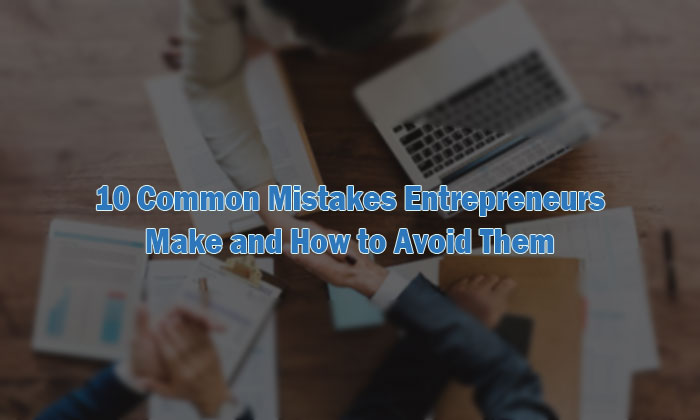
Starting a business is an exciting journey, but it is also filled with challenges that require careful planning, strategic thinking, and resilience. Entrepreneurs often face various obstacles, especially in the initial stages of launching their startups. While mistakes are a natural part of the process, they can be costly and sometimes irreversible. Identifying common missteps and understanding how to avoid them can significantly increase the likelihood of success for new ventures. In this article, we’ll explore ten common mistakes entrepreneurs make and provide practical advice on how to steer clear of them.
1. Lack of Clear Vision and Planning
One of the most common mistakes entrepreneurs make is not having a clear vision or business plan. Many are so focused on getting started that they neglect to outline their goals, target market, and strategies for growth. Without a roadmap, it’s easy to lose direction.
How to Avoid It: Before launching, spend time developing a clear vision for your business. Define your mission, set long-term goals, and create a detailed business plan that covers aspects like marketing, operations, and financial projections. Regularly revisit and adjust the plan as needed to stay on track.
2. Underestimating Capital Needs
Many entrepreneurs underestimate how much money is required to get a business off the ground. Whether it’s underestimating startup costs or miscalculating the amount needed to sustain the business during its early stages, this mistake can quickly lead to financial struggles.
How to Avoid It: Conduct thorough research to estimate startup and operational costs accurately. Consider all potential expenses, including product development, marketing, staffing, and any unforeseen challenges. Ensure you have sufficient funds to cover both expected and unexpected costs and avoid relying solely on short-term financing.
3. Ignoring Market Research
Some entrepreneurs make the mistake of launching a product or service based on what they think the market needs, rather than conducting comprehensive market research. This leads to poor product-market fit and low customer demand.
How to Avoid It: Invest time in market research to understand customer needs, industry trends, and competitor strategies. Use surveys, focus groups, and other tools to gather insights into your target audience. This will help you develop a product or service that resonates with your customers and fills a gap in the market.
4. Failing to Build a Strong Team
As a solo entrepreneur, it may seem tempting to try to do everything yourself, but this approach can lead to burnout and missed opportunities. A strong, capable team is essential for scaling your business and handling various aspects of operations.
How to Avoid It: Focus on hiring individuals who complement your skills and bring unique expertise to the table. Ensure that team members are aligned with your business vision and culture. Invest in developing your team’s abilities through training and clear communication to foster a positive work environment.
5. Neglecting Customer Feedback
Many entrepreneurs believe that once their product or service is developed, it’s ready to go. However, neglecting customer feedback can result in products that do not meet customer needs or expectations, causing dissatisfaction and loss of business.
How to Avoid It: Regularly solicit feedback from your customers, both positive and negative. Use surveys, social media, or one-on-one interactions to understand their pain points and preferences. Use this feedback to improve your product, service, and customer experience continuously.
6. Overlooking Legal and Regulatory Requirements
Startups often overlook the importance of understanding the legal and regulatory framework within which they operate. Failing to comply with tax laws, licensing requirements, or intellectual property regulations can lead to costly fines, lawsuits, or even business shutdowns.
How to Avoid It: Consult with legal experts to ensure that your business is compliant with all relevant laws. Obtain the necessary licenses, file for trademarks or patents if applicable, and stay updated on industry regulations. This will help you avoid potential legal issues down the line.
Also read other business articles on Destyless:
- How to Start a Business from Scratch: A Beginner’s Guide
- The Great Copywriting Debate: Short and Snappy vs. Long and Detailed
- Bank Check Fees Today – Minimize What You Pay
7. Ineffective Marketing Strategies
Many entrepreneurs underestimate the importance of marketing in attracting customers. Whether it’s relying solely on word-of-mouth or not investing enough in digital marketing, neglecting marketing efforts can prevent your startup from gaining the visibility it needs.
How to Avoid It: Develop a comprehensive marketing strategy that includes both digital and traditional channels. Leverage social media, search engine optimization (SEO), content marketing, and paid ads to drive traffic and generate leads. Test different strategies and track results to optimize your approach.
8. Scaling Too Quickly
While growth is the ultimate goal for any entrepreneur, scaling too quickly without sufficient resources, infrastructure, or market demand can be detrimental. Overexpansion can lead to operational inefficiencies, cash flow issues, and loss of customer trust.
How to Avoid It: Focus on building a strong foundation before scaling. Ensure your product, team, and systems are in place to support growth. Expand gradually and monitor the impact of growth on operations, customer satisfaction, and profitability.
9. Failing to Adapt to Change
The business landscape is constantly evolving, and entrepreneurs who fail to adapt to changes in technology, consumer behavior, or market conditions risk falling behind. Inflexibility can prevent a startup from seizing new opportunities or addressing emerging challenges.
How to Avoid It: Stay informed about industry trends and continuously innovate. Be open to pivoting your business model or product offerings in response to market shifts. Foster a culture of agility and resilience within your organization to keep up with changing demands.
10. Burnout and Poor Work-Life Balance
Entrepreneurship can be all-consuming, and many entrepreneurs sacrifice their health and personal life in the pursuit of success. This can lead to burnout, poor decision-making, and a lack of motivation, which ultimately harms the business.
How to Avoid It: Set boundaries and prioritize self-care. Delegate tasks to your team to avoid taking on too much. Take regular breaks and make time for activities that recharge you, such as exercise or spending time with loved ones. A balanced approach will help you stay focused and productive in the long run.
Conclusion
While the journey of entrepreneurship is challenging, it can also be incredibly rewarding. By recognizing common mistakes and taking proactive steps to avoid them, you can position your startup for long-term success. Remember that learning from your mistakes is part of the process, but by being aware of these pitfalls, you can minimize their impact and build a strong, sustainable business.






